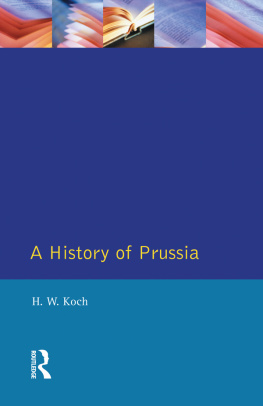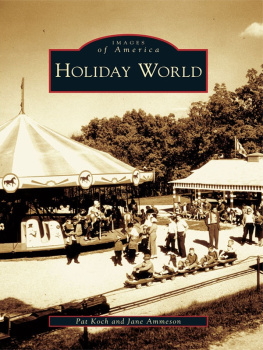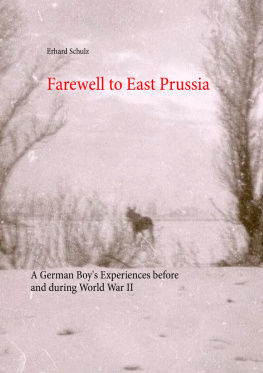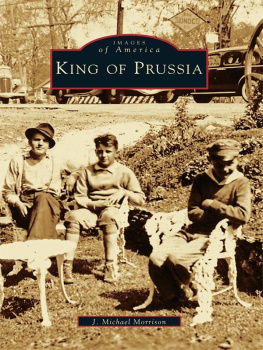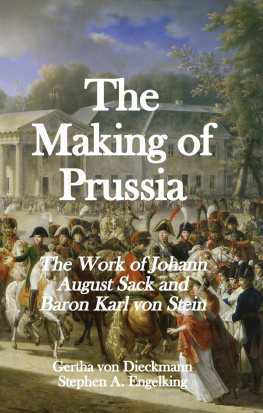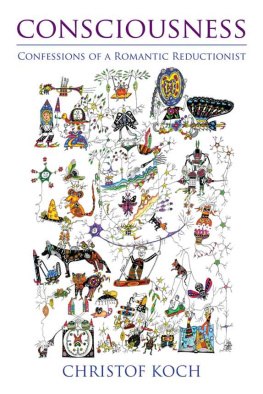A History of Prussia
First published 1978 by Addison Wesley Longman Limited
Sixth impression 1996
Published 2014 by Routledge
2 Park Square, Milton Park, Abingdon, Oxon OX14 4RN
711 Third Avenue, New York, NY 10017, USA
Routledge is an imprint of the Taylor & Francis Group, an informa business
H. W. Koch 1978
All rights reserved. No part of this book may be reprinted or reproduced or utilised in any form or by any electronic, mechanical, or other means, now known or hereafter invented, including photocopying and recording, or in any information storage or retrieval system, without permission in writing from the publishers.
Notices
Knowledge and best practice in this field are constantly changing. As new research and experience broaden our understanding, changes in research methods, professional practices, or medical treatment may become necessary.
Practitioners and researchers must always rely on their own experience and knowledge in evaluating and using any information, methods, compounds, or experiments described herein. In using such information or methods they should be mindful of their own safety and the safety of others, including parties for whom they have a professional responsibility.
To the fullest extent of the law, neither the Publisher nor the authors, contributors, or editors, assume any liability for any injury and/or damage to persons or property as a matter of products liability, negligence or otherwise, or from any use or operation of any methods, products, instructions, or ideas contained in the material herein.
ISBN 13: 978-0-582-48190-9 (pbk)
Library of Congress Cataloging in Publication Data
Koch, Hannsjoachim W.
A History of Prussia.
Includes index.
1. Prussia History. I. Title.
DD347.K6294377-22437
ISBN 0-582-48190-2
Contents
The primary intention of this book is to provide the general reader and the student with a reasonably comprehensive history of the Prussian state , to fill a gap in the existing literature on Prussia, at least of English-speaking countries. Until now, after reading F. L. Carstens excellent Origins of Prussia , the reader in order to enrich and expand his knowledge of Prussia had to turn to biographies or extract information from general histories of Germany. Yet even in the realm of the political biography Prussia is not particularly well served. Even in German there exists no satisfactory biography of so crucial a personality as was the soldier king Frederick William I; C. Hinrichs masterpiece has remained incomplete and takes us only to the point of Frederick Williams accession to the throne. Only his son Frederick the Great and later Bismarck have received extensive treatment by historians; whether satisfactorily is another matter. Bismarck apart, only Stein seems to have captured the imagination of an English biographer. But Seeleys three-volume biography so rich in material, seems to have been largely forgotten.
Given the decisive role Prussia played in German and European history, a history of Prussia is rather more important than say that of Bavaria although a Bavarian might well vociferously object to this. Since the author is himself German, born in Bavaria, of Prussian-Huguenot descent, he would reject any charge of writing from a specifically Prussian point of view, although he has taken account of the merits of that point of view.
There is no point in trying to disguise the fact that in its own way this history of Prussia is revisionist in its approach. But it should never be the task of the Historian to tread in the well-trodden footsteps of the past seven decades, to do no more than touch up old clichs, themselves the product of feverish and sometimes rightly embittered minds. On the other hand little purpose would be served by replacing unsound opinions and judgements by their distorted opposites. The task this author has set himself is to look at Prussias history in its own terms and context, rejecting outright the approach which views German history and that of Prussia within it against the background of the Wilhelmine era, or even that of the atrocities of the Third Reich.
One of the many problems when dealing with the Prussian state is to decide when it came to an end. Should it be 1871 when Germany was reunified and Prussia merged into the Reich; should it be 1918 when the Hohenzollern dynasty abdicated; or 1932 when Chancellor von Papen put an end to the last Prussian government; or 1947 when the victors of the Second World War formally dissolved Prussia? This author, for reasons mentioned in the last two chapters of the book, decided on 1871. Therefore the political developments in Prussia after 1871 have been indicated in outline only.
A work of this nature is deeply indebted to other historians who in their work have provided the new materials and insights on which this book is based. More detailed reference to these will be found in the bibliography. However, the author is also deeply in debt to the Inter-Library Loan Service of the Morell Library of the University of York and its staff, without the aid of whom many of the works used would have been inaccessible. Needless to say he is also in debt to many individuals, foremost among them Frau Magdalena Sailer, Kirchdorf bei Haag/obb, Frau Karla Zapf, Munich, Frau Franziska Henning, Berlin-Dahlem who provided the atmosphere of calm and quiet in which this book was written.
H. W. Koch
York and Munich, 1977
For Verona
Chapter 1
The Teutonic Order
Ruthlessness, romantic idealism and other similar characteristics are attributed to the Deutschritter Or den, the Teutonic Knights. Yet the story of this order is less colourful than that of similar orders such as the Templars. Most of them claimed not always quite correctly that their origins dated back to St Bernard of Clairvaux, who had issued the Rule of the Templars to two knights, Hugo of Payens and Godfrey of St Omer; rules closely modelled on St Bernards own order, in a spirit of profound Christian devotion and strict asceticism. At the time of the second crusade, St Bernard himself called for recruits for the Templars, and in a tract issued for this purpose he wrote:
The warriors are gentler than lambs andfiercer than lions, wedding the mildness of the monk to the valour of the knight, so that it is difficult to decide which to call them: men who adorn the Temple of Solomon with weapons instead of gems, with shields instead of crowns of gold, with saddles and bridles instead of candelabra; eager for victory not for fame; for battle not for pomp; who abhor useless speech, unnecessary action, unmeasured laughter, gossip and chatter, as they despise all vain things; who, in spite of their being many, live in one house according to one rule, with one soul and one heart . (Ernst Kantorowicz)
St Bernards foundation did not put an end to the hero of the age of chivalry and his courtly pursuits, but countered the restless, vacillating secular knight errant, who flew from adventure to adventure, or sacrificed himself in the service of his lady-love, leading his own individual life and entirely destructive to the firm fabric of the state with a closed, rigidly disciplined corporation, dedicated, as in the case of the Templars, to the service of Christ, their spiritual head. They were monks, actively serving a common purpose with the New Testament and the sword, men who subordinated themselves to a common master. In modern terminology: they were activists of the word and the sword, recognizable by the uniformity of their dress, the mantle with the cross, and style of life.
But as with all human institutions, the original idealism could not be sustained indefinitely. By the end of the twelfth century, spiritual knighthood seemed almost extinct. The institutions of the Knights of the Templars, whose members were mainly French, and the Knights of St John, composed largely of English and Italian members, seemed on the wane, perhaps even on the point of disintegration. Yet precisely at this point in time, in 1190, a new order made its appearance, one which was to be called the Teutonic Order. The initiative for it, however, did not come from the clergy, nor for that matter from German knights, but from German burghers, merchants from Bremen and Lbeck, the old cities of the Hanseatic League.

